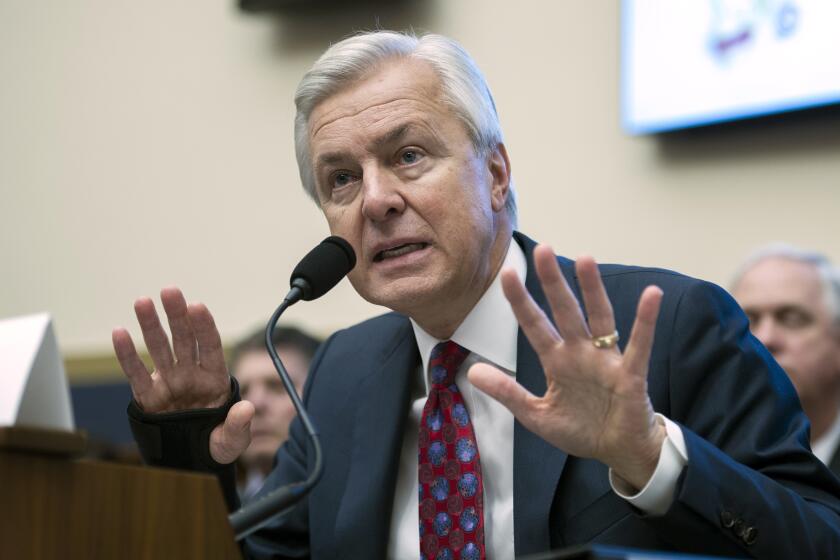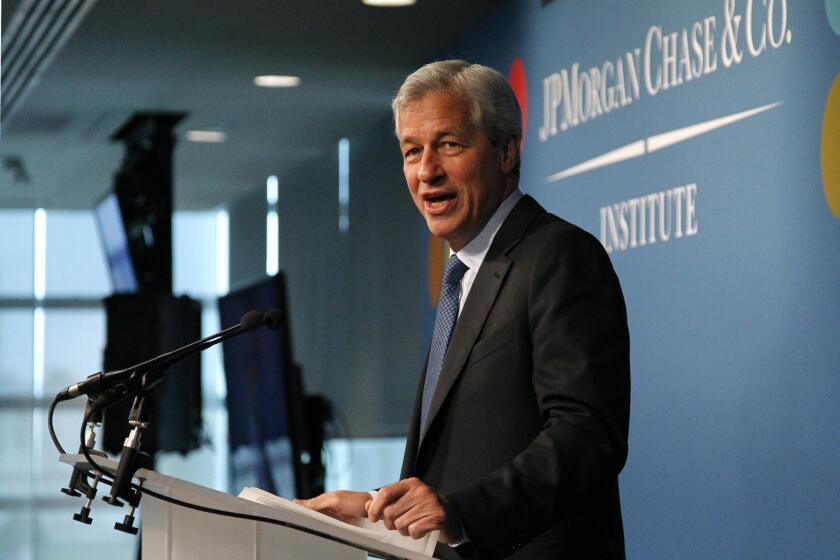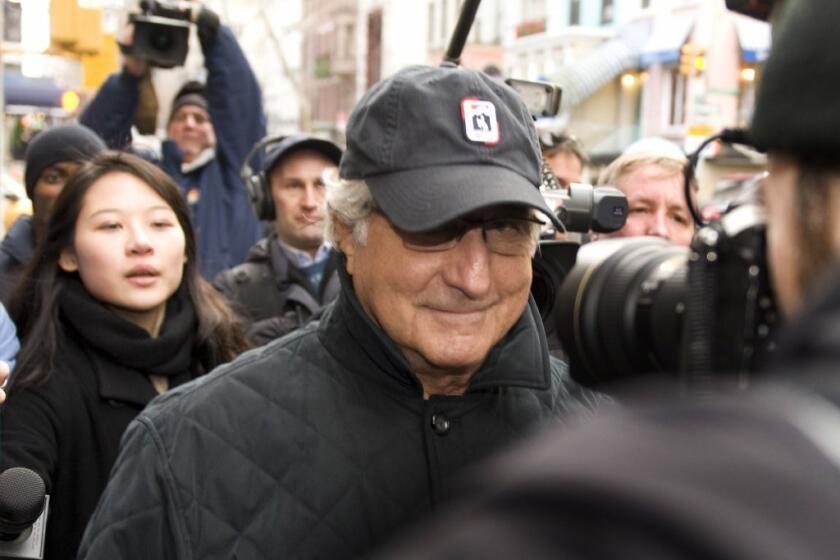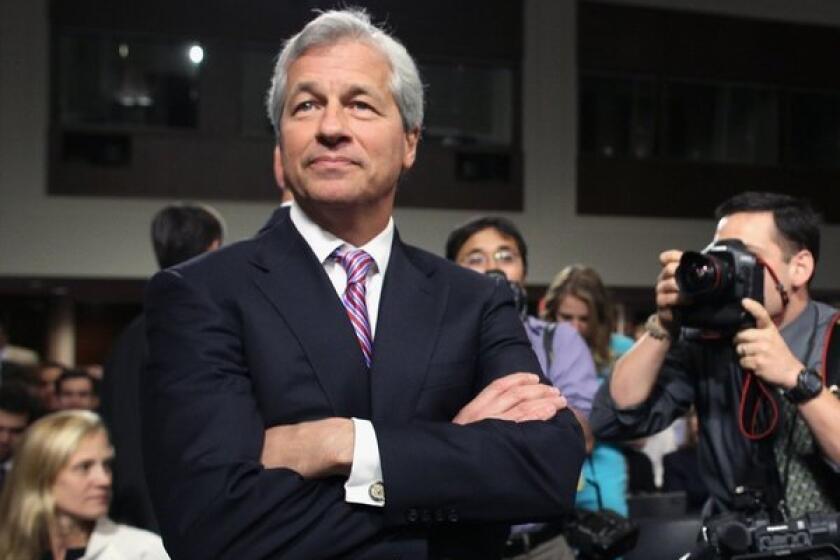Column: Jeffrey Epstein reaches from the grave to expose how JPMorgan profited from his sex trafficking
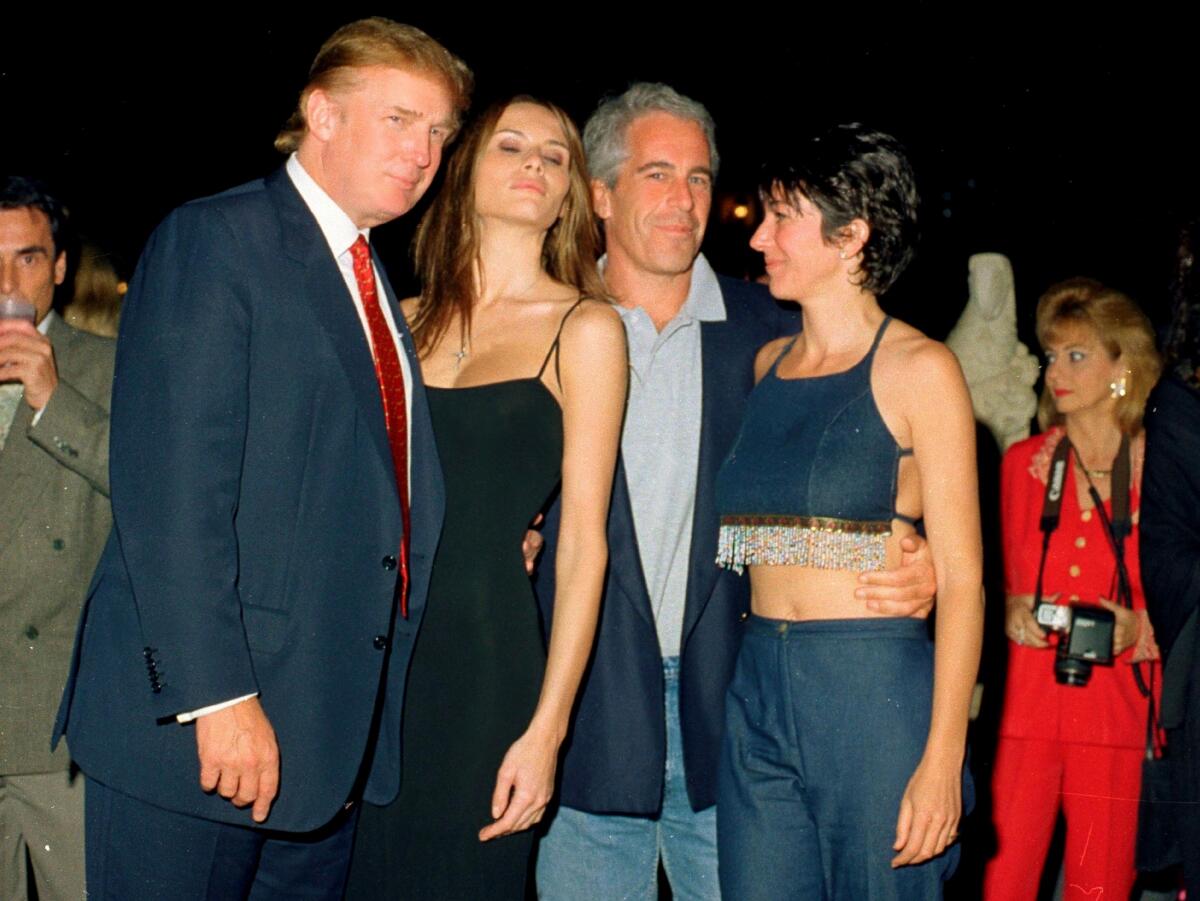
You can place the top executives of JPMorgan Chase & Co. high on the list of people who wish they had never heard the name Jeffrey Epstein.
The giant bank has been struggling for years with accusations that it was complicit with Epsteinâs horrific criminal record of sex trafficking and sex slavery.
For the record:
5:20 p.m. Sept. 26, 2023An earlier version of this article incorrectly identified Leslie Wexner as the founder of Victoriaâs Secret. He was its owner.
Update:
7:48 a.m. Sept. 26, 2023Shortly after this column was published, JPMorgan Chase and the U.S. Virgin Islands announced a settlement in which the bank will pay $75 million to the Virgin Islands to resolve the territoryâs lawsuit. The settlement includes $55 million for efforts to combat human trafficking and augment law enforcement on the islands, and $20 million in lawyersâ fees. The bank said it also reached a confidential settlement with former executive James âJesâ Staley.
In June, for example, the company agreed to pay $290 million to settle a class-action lawsuit with potentially more than 100 plaintiffs claiming they were Epsteinâs victims.
Cash was the lifeblood of Epsteinâs operation.
— U.S. District Judge Jed S. Rakoff
In doing so, the bank acknowledged that its association with Epstein âwas a mistake and we regret it,â JPMorgan spokeswoman Patricia Wexler told me by email. âWe would never have continued to do business with him if we believed he was using our bank in any way to help commit heinous crimes.â
The statement continued, âWe all now understand that Epsteinâs behavior was monstrous, and we believe this settlement was in the best interest of all parties, especially the survivors, who suffered unimaginable abuse at the hands of this man.â
Get the latest from Michael Hiltzik
Commentary on economics and more from a Pulitzer Prize winner.
You may occasionally receive promotional content from the Los Angeles Times.
In settling, however, JPMorgan didnât admit liability for Epsteinâs crimes. You can judge for yourself whether $290 million isnât a handsome settlement in a case in which a defendant denies liability, even for a bank as big as JPMorgan, which reported a profit of $37.7 billion last year on $128.7 billion in revenue. (The agreement is awaiting final approval from U.S. District Judge Jed S. Rakoff.)
That settlement left JPMorgan still facing a possible reckoning in federal court due to a lawsuit brought by the U.S. Virgin Islands, a Caribbean territory where Epstein owned an island reportedly used as a trafficking site.
The bank finally disposed of that threat Tuesday, when it reached a $75-million settlement with the territory, including $55 million that will be used to augment the islandsâ law enforcement capabilities and help charities devoted to assisting crime victims. Of the total, $20 million will go to lawyer fees.
The territory brought the suit, says Ariel Smith, its attorney general, to âput Wall Streetâs executives on notice that they can no longer profit from or participate in human trafficking, and they must report its signs as federal law requires. Simply put, childrenâs safety depends on Wall Street executives following the law.â
The law at issue is the federal Trafficking Victims Protection Act of 2000, which aimed to ease the prosecution of slavery in all forms to prevent the practice and protect potential victims.
The Virgin Islands asserted that JPMorgan â and Deutsche Bank, which took on Epstein as a client after Morgan dumped him in 2013 â obstructed the law, in part by failing to promptly file âsuspicious activity reportsâ with banking authorities; had the banks followed the rules, the territory says, government authorities might have been alerted to Epsteinâs crimes much sooner than they were.
Wells Fargoâs use of corporatespeak to pretend it did nothing wrong reflects a tendency of American business regulators to go easy on big companies caught violating the law.
The territory originally sought a penalty of at least $150 million to give JPMorgan, not to mention other banks, the economic incentive in the future âto place compliance with the law and prevention of trafficking ahead of its own profits,â Smith said.
According to documents unearthed by the Virgin Islands during pretrial discovery, those profits were copious. The territory said it could prove that JPMorgan collected $40 million in fees through its relationship with Epstein, including $20 million from Epstein himself and another $20 million from clients he brought the bank, including Google co-founder Sergey Brin, Bill Gates and Leslie Wexner, the founder of the Limited. (A spokesman for Gates says he never became a client of JPMorgan.)
That points to the main issue here: bringing financial institutions to book for facilitating wrongdoing by their clients.
This is not the first time that JPMorgan has been accused of allowing criminal activities to take place in front of its eyes. In 2014, the bank paid a $1.7-billion federal penalty and was forced to admit its responsibility for allowing Bernie Madoff to conduct his Ponzi scheme as a bank client.
âJPMorgan, because of its unique vantage point as [Madoffâs] banker, had reason to be suspicious about Madoff,â then-U.S. Atty. Preet Bharara of New York said at the time. Its own bankers had noticed that Madoffâs trading and profit claims were suspect, but it never informed government regulators and failed to file a suspicious activity report that would have alerted the authorities.
Morgan is not necessarily alone in turning a blind eye to wrongdoing by its clients. Banks and other financial institutions have the vantage point that Bharara spoke of that would expose scams and schemes before they could victimize innocent people if the banks would only speak up. Instead, itâs all too common for these institutions to act as though theyâre mere conduits for financial transactions, rather than crucial players â participants in all but name.
Thatâs certainly the case with Epstein, who died in police custody, apparently by his own hand, in 2019 while facing federal sex trafficking charges.
âCash was the lifeblood of Epsteinâs operation,â Judge Rakoff observed in May in explaining his decision to allow the lawsuits by the Virgin Islands and the Epstein victims to go forward against JPMorgan and Deutsche Bank. The cash, it goes without saying, passed through the banksâ fingers.
You might think that the chairman and CEO of a major bank that had just pleaded guilty to a federal felony charge and has paid out more than $20 billion in legal settlements in recent years would show a little humility.
JPMorganâs $290-million settlement and a separate $75-million agreement by Deutsche Bank will close the victimsâ cases, assuming Rakoff approves them.
The crux of JPMorganâs defense against the Virgin Islands lawsuit was that the wrongdoing was perpetrated by one individual. Thatâs James E. âJesâ Staley, who in a 33-year career with the bank rose to become chief executive of its corporate and investment banking unit and an oft-mentioned successor to Chairman and CEO Jamie Dimon.
Staley, who left JPMorgan in 2013 and subsequently became CEO of Barclays Bank, had earlier been CEO of Morganâs asset management business. That purportedly first brought him into contact with Epstein, who became a highly valued client. Staley resigned from Barclays in 2021, after British authorities concluded that he hadnât given them a complete picture of his relationship with Epstein.
Their conclusion resembles JPMorganâs argument. The bank says that Staley never told anyone there âthat he had witnessed, was aware of, or participated inâ Epsteinâs sex trafficking.
Why, the bank says, Staley even signed the bankâs code of conduct every year, in which he agreed to meet its âhighest ethical standards,â comply with all legal and regulatory requirements, and refrain from any conduct that could âreflect adverselyâ on his employer. In other words, donât blame JPMorgan.
If thereâs a better indication that corporate codes of conduct are designed more to shield corporations from legal liability than to hold their employees to the highest ethical standards, I canât imagine it.
Letâs get a few points straight regarding the federal governmentâs âbigâ $2-billion-plus settlement with JPMorgan Chase over the bankâs complicity in the Madoff case. -- First, JPMorgan, where Madoff kept his major bank accounts and which profited handsomely off its relationship in numerous ways, knew Madoff was crooked.
The bank sued Staley in March, accusing him ofconcealing what he knew about Epstein; Staley said that although he was friendly with Epstein, he knew nothing about his crimes. (The bank announced a settlement with Staley Tuesday, on confidential terms.)
For all that, Morganâs defense warranted a handful of, shall we say, quibbles.
First and foremost, Epsteinâs criminality was no secret to JPMorgan or anyone else in the world, certainly not after 2006, when Epstein was charged in Florida with soliciting an underage prostitute; he pleaded guilty in 2008 and was sentenced to 18 months in jail and served more than a year.
By then, he had been sued twice for $50 million each by anonymous plaintiffs who accused him of keeping them as sex slaves. Both cases were dismissed, but they painted a picture of a sex maniac who kept young women for his own pleasure and that of well-placed friends. Further allegations were aired in the press during the ensuing years.
Internal JPMorgan emails obtained by the Virgin Islands in pretrial discovery revealed that compliance executives at the firmâs private bank unit, which handled the richest clients, were becoming increasingly agitated over the bankâs relationship with Epstein.
The executives were fully alive to the nature of his activities and repulsed by the bankâs role in funneling cash from his accounts to women identified as his âfriends,â in sums of tens of thousands of dollars at a time. A huge portion of these payments, they noted, went to women with Eastern European names, a red flag for human trafficking investigators.
The headline number on the big JPMorgan Chase legal settlement with state and federal regulators hasnât changed in the weeks since the negotiations over the deal first broke into the open: $13 billion.
They were especially concerned because the bank was leading an anti-human trafficking initiative in the banking industry, from which it hoped to garner some positive PR.
One compliance officer wrote to another in 2010 about his fear that the bankâs âtouting of good will on [human trafficking]â would fall flat if critics pointed out that JPMorgan was the bank for âEpstein, a known child sleaze.â
Although bank policy required account managers to obtain explanations from clients for large cash withdrawals and âassess the plausibility of these explanations,â Epsteinâs contacts at JPMorgan waved his explanations through, even when they were transparently absurd.
Asked about a string of withdrawals of $20,000 to $40,000 at a time, Epstein explained them as âfuel payments in foreign countriesâ for his private plane. Yet at the time he was under house arrest and not permitted to travel abroad.
Epsteinâs behavior, including his predilection for sex with minors, was so well known around the JPMorgan water cooler that it became a running joke in the office. After visiting the house of another client, a top executive of the bankâs asset and wealth management unit reported to the unitâs chief executive that it âreminded me of JEâs house, except it was more tasteful, and fewer nymphettes.â
The compliance executivesâ pleas for JPMorgan to drop Epstein as a client were consistently rejected by his bankers, who were more concerned with toting up the money he brought in as one of their most valuable customers.
According to the documents obtained by the Virgin Islands through discovery, in 2003 Epstein accounted for $8 million in revenue for the wealth management unit, nearly twice the amount coming from the unitâs second-largest client. He was also valued for his connections, which brought new ultrarich clients to the bank.
But Morgan did not âfireâ Epstein as a client until 2013, after Staley, who had become his chief contact at the bank, had departed.
Itâs entirely fair to say that Epstein would have been brought to justice well before July 2019, when he was arrested on federal sex-trafficking charges, if JPMorgan merely told authorities what it knew and provided them with the documentation of his financial transactions that the bank held in its possession.
That these were âsuspiciousâ as defined by the federal disclosure law is hardly subject to question, since so many of the bankâs own executives knew it. Instead, they kept him on as a valued client until the relationship became utterly untenable. So letâs be clear: As an institution, JPMorgan knew what Epstein was up to and let dollars do its thinking about it.
Will the millions of dollars the bank will have to shell out because it turned a blind eye to Epstein keep it from making the same mistake again? We wonât know unless another scandal erupts â or, more likely, until it erupts.
More to Read
Get the latest from Michael Hiltzik
Commentary on economics and more from a Pulitzer Prize winner.
You may occasionally receive promotional content from the Los Angeles Times.
